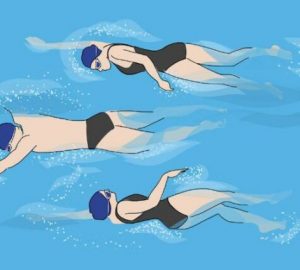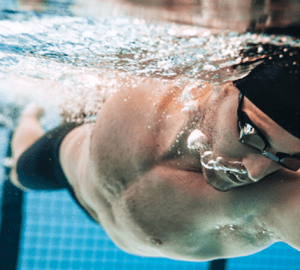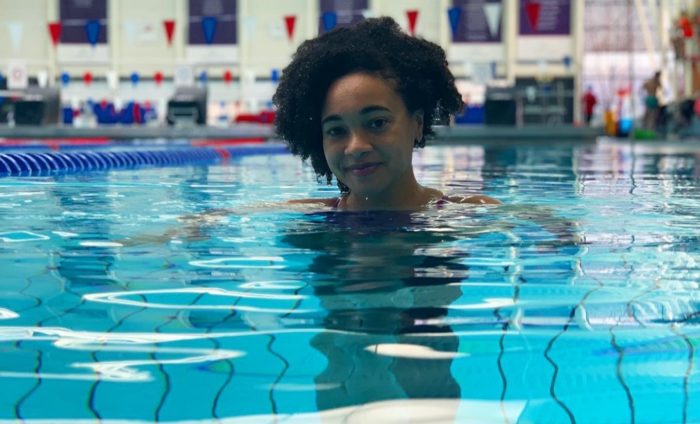
Three sets for short, medium and long distance swimmers
Try these three pool-based training sessions for short, medium and long distance swimmers. Short distance we’ve taken as 750m to 1600m (1 mile). Medium distance is up to around 5km – a popular race distance. Long distance swimmers are often in the water for in excess of two hours, when aerobic efficiency becomes critical. As training should be progressive we’ve provided suggestions on how to develop and build the sessions into a programme.
The core block of each session is designed around your Critical Swim Speed or CSS pace and can therefore be used whatever your speed (see the Swim Smooth website to learn more about CSS and how to calculate it).
Short distance (for those wanting to race 750m to 1600m)
Warm up: 4x100m FS (+5 seconds rest after each 100m). Focus on exhalation and BB every 3 or 5 strokes
Build set: 8x25m (+5 sec) swimming with an ankle band or wearing shorts, overcome the resistance or drag issues by focusing on optimising your catch and pull and streamlining your body and leg positioning. Stay ‘in the moment’ on each length and focus on improving efficiency a bit further each time
Main set: 200m FS swim as a negative split, starting out below CSS pace and increasing speed to swim at CSS on the second 100m +15 sec (rest at end)
4x50m PULL @ CSS pace +10 sec. Deep water starts, no wall push offs, work on accelerating stroke rhythm
200m FS swim as positive split, going out faster than CSS on the first 100m, then settling into CSS pace on the second 100m +15 sec
4x100m PULL @ CSS pace +10 sec
200-400m FS drafting with a partner, swap the lead after 100m. Lead swimmer to swim slightly faster than CSS pace, drafting swimmer to practise effective drafting on hips or feet of lead swimmer +15 sec
Cool down: 100-200 easy, incorporate at least 50m BS
Total: 1900-2000m, < 1 hour
Progression ideas
- Extend the build set with more ‘stay in the moment’ adversity training with ankle band, wearing shorts or T-shirt or breathing every 7 or 9 strokes on the 25m efforts.
- Note the different response from your body on the positive and negative split 200m efforts, particularly the recovery times (which may feel insufficient on the positive split effort) and impact on the subsequent set. Extend this exercise to 400m in the main set.
- Adapt the main set as: 400 @ CSS, then complete 2x400m as negative and positive splits for comparison and conditioning
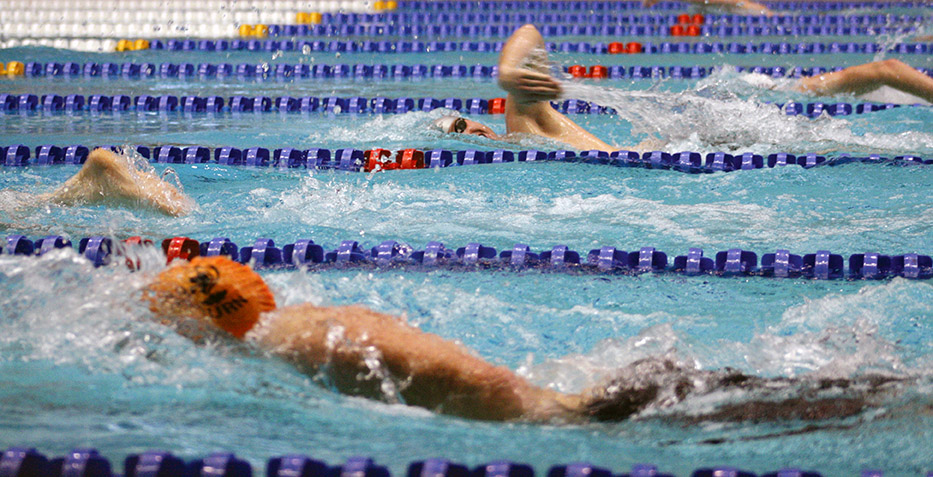
Medium distance (3km to 5km)
Warm up: 3x200m FS (+10 sec rest) Focus on exhalation and BB every 3 strokes, incorporate at least 50m (on each 200m) breathing every 5 strokes to extend your exhalation capabilities
Build set: 8x50m (+10 sec) swimming with an ankle band or wearing shorts, overcome the resistance or drag issues by focusing on optimising your catch and pull and streamlining your body and leg positioning. Stay ‘in the moment’ on each length and focus on improving efficiency a bit further each time
Main set: (repeat two to three times)
200m FS swim as a negative split, going out below CSS pace and then increasing to swim at CSS on the second 100m +15 sec
4x100m PULL @ CSS pace +10 sec
200m FS swim as positive split, going out fast on the first 100m and then settling into CSS pace on the second 100m +15 sec
2 to 4x100m as IM in order of – FLY, BS, BRS, FS +15 sec. Fins optional. Substitute FLY drill or kick for FLY stroke if necessary +15 sec
400m FS drafting with a partner or small group of four swimmers. Swap the lead every 100m. Lead swimmer to swim slightly faster than CSS pace; drafting swimmer(s) to practise effective drafting on hips or feet of lead swimmer. Practise breathing towards each other (UB 2 or 4 strokes), increasing adversity factors by ‘squeezing’ each other into the lane ropes or turning fast or unpredictably off line seeking a better drafting position from the wall turns. +30 sec rest.
Cool down: 200-400 easy, incorporate at least 100m BS
Total: 4000-5800m, 1 – 1.5 hour
Progression ideas
- Complete 2-3 ‘sink downs’ during the warm up, in between each 200m to develop consistent exhalation.
- Extend the build set with more ‘stay in the moment’ adversity training with ankle band, wearing shorts or T-shirt or breathing every 7 or 9 strokes on the 25m efforts.
- Note the different response from your body on the positive and negative split 200m efforts, particularly the recovery times (which may feel insufficient on the positive split effort) and impact on subsequent set. Extend this exercise to 400m in the main set.
- Start the main set with 4x100m medley, before going straight into 4x100m @CSS, then complete the negative/positive split comparison exercise as 200m or 400m. Repeat this main set through two to three times as per the session above.
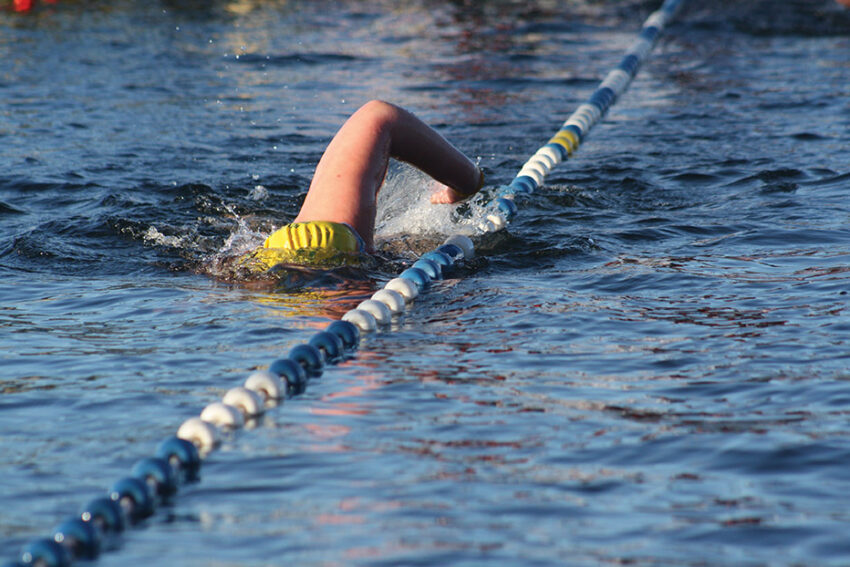
Long distance (10km+)
Warm up: 3x400m FS (+10 sec rest) Focus on exhalation and BB every 3 strokes, incorporate at least 100m (on each 400) breathing 5 and 7 strokes to extend your exhalation capabilities and check relaxation to begin the session
Build set: 8x50m (+10 sec) swimming with an ankle band or wearing shorts, overcome the resistance or drag issues by focusing on optimising your catch and pull and streamlining your body and leg positioning. Stay ‘in the moment’ on each length and focus on improving efficiency a bit further each time
Main set: (repeat four to five times)
400m FS swim as a negative split, starting below CSS pace and then improving pace to swim at CSS on the second 100m +15 sec
4x100m PULL @ CSS pace +10 sec. Deep water starts, no wall push offs, work on accelerating stroke rhythm
400m FS swim as positive split, starting out faster than CSS pace on the first 100m and then settling into CSS pace on the second 100m +15 sec
4x100m as IM in order of – FLY, BS, BRS, FS +15 sec. Fins optional, substitute FLY drill or kick for FLY stroke if necessary +15 sec
400m FS drafting with a partner or small group of four swimmers, swap the lead every 100m. Lead swimmer to swim slightly faster than CSS pace, drafting swimmer(s) to practise effective drafting on hips or feet of lead swimmer +30 sec. Practise breathing towards each other (UB 2 or 4 strokes), increasing adversity factors by ‘squeezing’ each other into the lane ropes or turning fast or unpredictably off line seeking a better drafting position from the wall turns.
Cool down: 400m easy, incorporate at least 200m BS
Total: 10000-12000m
Progression ideas
- Complete 2-3 ‘sink downs’ during the warm up, in between each 400m to further develop consistent exhalation.
- Extend the build set with more ‘stay in the moment’ adversity training with ankle band, wearing shorts or T-shirt or breathing every 7 or 9 strokes on the 25m efforts.
- Note the different response from your body on the positive/negative split 400m efforts, particularly the recovery times (which may feel the effects of lactate build-up and discomfort on the positive split effort) and subsequent impact on the rest of the set. Extend this exercise to 800m in the main set.
- Start the main set with 6-8×100 medley, before going straight into 8×100 @CSS, then complete the negative/positive split comparison exercise as 400m or 800m. Repeat this set through 4-5 times.
Guidance notes
CSS – Critical Swim Speed. Effectively training at your threshold pace provides you with significant speed efficiency gains
Pacing – using the pool clock, your own stopwatch or a timing device such as a Finis Tempo Trainer or Wetronome
BB = Bilateral Breathing
UB = Unilateral Breathing
BS = Backstroke
FS = Freestyle or front crawl
BRS = Breaststroke
FLY = Butterfly
PULL = Swimming with a pullbuoy or float between your legs. No kicking.
Swim Smooth Squad training and video analysis sessions
Triathlon Europe provides weekly Swim Smooth squad training in South West London. The squad enjoy training all year round in fabulous indoor and outdoor 33m pools. Fiona offers 1-2-1 video analysis sessions and stroke correction sessions on weekday mornings and weekend Swim Smooth workshops.
Find out more: www.fionafordcoaching.com







